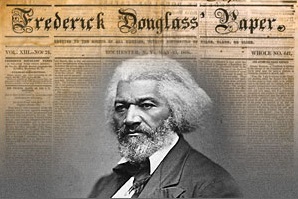“Abolition of slavery had been the deepest desire and the great labor of my life”
Frederick Douglass, née Frederick Augustus Washington Bailey, was born into slavery in Tuckahoe, Talbot County, Maryland. A runaway slave, he became an abolitionist and civil rights leader, social reformer and eventually one of the most influential African American intellectuals of the times. Douglass made history as the first African American to hold a government position and to receive a vote for nomination as president of the United States at the Republican National Convention of 1888. His vision was finally realized when Barack Obama became the first African American president of the United States on November 2008.
Douglass wrote three autobiographies: Narrative of the Life of Frederick Douglass in 1845, My Bondage and My Freedom in 1855 and Life and Times of Frederick Douglass in 1881.
 Frederick Douglass witnessed all the horrors and cruelties of slavery. From the time he was born he was separated from his mother, followed by the feeling of abandonment he felt for the first time at age 7 when his grandmother left him in the Great House, to the fear and desperation with which he dealt everyday as a slave in the plantation. Despite these unfortunate and unfavorable circumstances he rose from total obscurity to a position of power as the first African American man who occupied a high government rank.
Frederick Douglass witnessed all the horrors and cruelties of slavery. From the time he was born he was separated from his mother, followed by the feeling of abandonment he felt for the first time at age 7 when his grandmother left him in the Great House, to the fear and desperation with which he dealt everyday as a slave in the plantation. Despite these unfortunate and unfavorable circumstances he rose from total obscurity to a position of power as the first African American man who occupied a high government rank.
Douglass’ achievements are owed only to himself, he was a “Self-Made Man”, the man he referred to in his famous speech, Self-Made Men. He owes nothing to birth, relationships, inheritance or early acquired education. He fully took advantage of the opportunities presented to him and worked hard at achieving his goal to end slavery, as he wrote in his last autobiography, Life and Times of Frederick Douglass: “Abolition of slavery had been the deepest desire and the great labor of my life”. As an agent for the Massachusetts Anti-Slavery Society, he toured New England six months a year gathering crowds and sharing his experience as a slave. He read journals and periodicals in his desire for knowledge and developed a polished speech and unmatched eloquence. He became a leader of the abolitionist movement.
In addition to touring the country giving lectures, he also chose to start a newspaper, The North Star, later renamed Frederick Douglass’ Paper, and after the Emancipation Proclamation, Douglass Monthly. In his editorials he tried to influence public opinion and policy towards a more equal society. The position he earned as aninfluential abolitionist led him to advice President Abraham Lincoln andto recruit African American soldiers for the first time to fight alongside the Union Army in the American Civil War.
When the Emancipation Proclamation by Abraham Lincoln went into effect on January 1st, 1863, Douglass persisted in his struggle to better the life of slaves by advocating for African American civil rights. This was the beginning of the Civil Rights Movement that set the pace for further change in the country. He advocated for equal treatment of black soldiers in the Union Army, civil rights and educational opportunities for African Americans, desegregation of schools and universal suffrage for black citizens and women.
Frederick Douglass is the image of the struggle and achievements of African Americans. His story was an inspiration then as it is today and his legacy continues to have a strong impact in today’s America.
